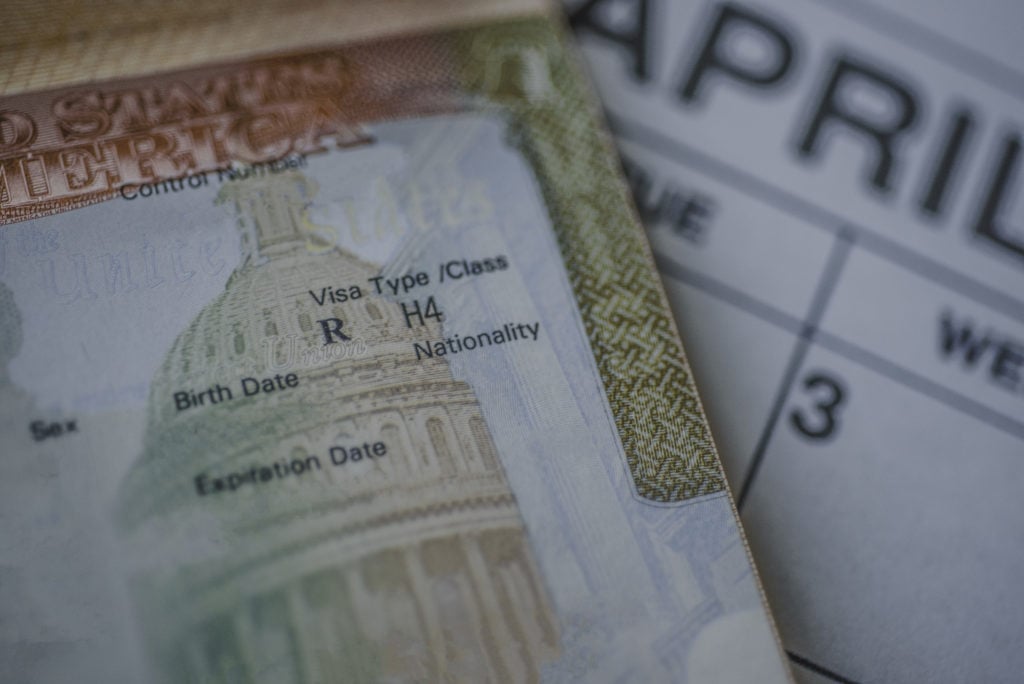What the New Rule Change to H-4 Visas Means and What You Can Do

The H-4 Visa allows skilled workers holding an H-1B to bring their spouses and children with them to the United States as dependents.
The H-4 Visa
With an H-4 visa, you can attend school, obtain a driver’s license and open a local bank account. You can also obtain an Employment Authorization Document (EAD) provided the H-1B holder has an approved I-140 Immigrant Petition. The United States Citizenship and Immigration Service (USCIS) issues the EAD, also known as a work permit, which authorizes you to work in the U.S. for a period of time, typically one year.
When it was first created, the H-4 visa did not have a mechanism to allow authorized work in the U.S., but all that changed in 2015 when the DHS changed the rules to allow H-4 workers to apply and receive EAD’s provided that the H-1B holder had an approved I-140 case.
The rules may be about to change again.
DHS Plans to Revoke the H-4 Visa EAD
There have been persistent rumors that the Trump administration intends to make substantial changes to the H-4 Visa that will permanently prevent holders of this visa from working in the United States.
Those rumors proved true. In February 2019, The Department of Homeland Safety (DHS) informed both the Office of Management and Budget (OMB) and Office of Information and Regulatory Affairs (OIRA) of their intention to remove holders of H-4 visas from the list of aliens eligible to apply for the EAD. Essentially this would prevent holders of H-4 visas from working while they are in the United States.
Typically, the DHS proposes and then publishes these rule changes and a final rule before implementation. Currently, the DHS has said that the earliest possible date of publication for this new rule on H-4 visas will not be until March or April 2020. Once published, there is a period of thirty to sixty days where the public can weigh in on the new rule.
Following this period of public comment, the DHS reviews feedback and then crafts the final rule. This is then sent to the OMB for approval and input before publication. This could take several months, and there is no guarantee that the OMB will approve the rule. Interested parties could also launch a legal challenge to the rule revoking H-4 EAD status.
It is important to note, however, that even though the rule change is several months away, the DHS has been firm in their intention to take H-4 visa holders off the list of aliens eligible to apply for an EAD.
Legal Challenges
The original 2015 rule that granted H-4 visa holders the right to apply to work in the United States is being challenged in court. Save Jobs USA represents a group of I.T. workers who claim they have lost their jobs to H-1 visa holders. They launched a challenge to the 2015 rule shortly after approval.
This court challenge is ongoing. Groups such as Immigration Voice are also involved. An attempt to have a federal appeal court throw out the case failed, and it was recently referred back to the lower courts for trial. At the same time, lawmakers in the House of Representatives introduced an H-4 EAD Protection Bill. However, the bill, introduced in the spring of 2019, is unlikely to be successful in protecting the rights of H-4 visa holders to work.
What This All Means For You
All of this means that eligible H-4 visa holders can and should continue to seek new or renewed work authorization under current rules.
H-4 visa holders should file their H-4 EAD applications as soon as they are eligible.The same is true for renewals. Renewals of H-4 EAD applications can be submitted up to six months before they expire, so again, it would be a good idea to file for renewal as soon as you are eligible.
The UCSIS continues to provide full three-year validity for H-4 EAD cards. Existing H4 EAD cards will likely remain valid even if the revocation of the rule is successful. If implementing this change, DHS will cease issuing new cards and renewals to H-4 visa holders.
The situation for anyone hoping to apply for an H-4 EAD card or a renewal continues to be volatile.
Here at Fok Immigartion Law, we are monitoring the proposed DHS rules and the court case closely and will post any new updates here as soon as we receive them.
Do You Need Help with Your H-4 or EAD Application? Contact us for a free case evaluation.


